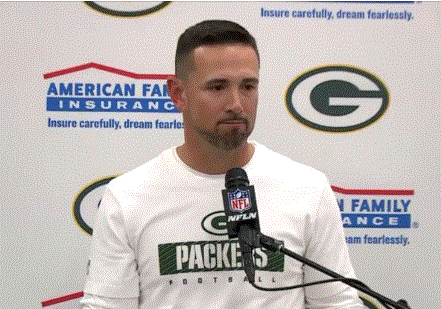
The Quarterback Effect in Green Bay: From Rodgers to Love, the Influence on Personnel Decisions
Over the years, the Green Bay Packers have developed a reputation not only for their storied history and loyal fanbase but also for the drama that sometimes surrounds their quarterback position—particularly when it comes to their influence on the front office. During Aaron Rodgers’ long and successful tenure in Green Bay, a peculiar pattern became evident to fans and commentators alike: when Rodgers would publicly praise a player, especially one not considered a major star, that player often found themselves off the roster not long after.
This odd trend became almost a running joke among Packers fans. One of the most well-known examples involves wide receiver Jake Kumerow, affectionately nicknamed “Touchdown Jesus” by fans because of his flowing hair and clutch touchdown receptions. Kumerow had carved out a niche for himself on the Packers’ roster as a dependable, hard-working receiver. When Rodgers complimented Kumerow during a press conference and praised his work ethic and performance, fans were hopeful that this meant more opportunities for him. Instead, Kumerow was released just days later, much to Rodgers’ reported frustration and the fan fanbase’s bemusement. It seemed that a quarterback’s approval was, paradoxically, a bad omen.
Rodgers vs. the Front Office
The Kumerow incident became emblematic of a deeper issue: the growing rift between Aaron Rodgers and the Packers’ management. Tensions simmered for years, but they boiled over following Rodgers’ MVP-winning campaign in the 2020 season. Despite his elite performance, Rodgers publicly voiced dissatisfaction with how the front office handled player personnel decisions. He felt out of the loop, disrespected, and increasingly alienated by the team’s unwillingness to consult him on matters that affected the locker room and the field.
In an attempt to mend the deteriorating relationship, the Packers made a symbolic gesture: they traded a sixth-round pick to bring back Randall Cobb, a wide receiver Rodgers had long championed and had shared a strong connection with on and off the field. Cobb had been let go previously when the Packers declined to offer him a third contract, allowing him to test free agency. Bringing him back was seen as a peace offering—an acknowledgment of Rodgers’ influence and value beyond just his on-field abilities.

Yet, that move did little to change the fundamental dynamics. Eventually, Rodgers departed the team, heading to the New York Jets and closing the chapter on a complex, sometimes contentious relationship with the Packers organization.
A New Era: Jordan Love Takes the Reins
With Rodgers gone, the spotlight shifted to Jordan Love, the young quarterback drafted in the first round of the 2020 NFL Draft. His selection, which many believe was the catalyst for Rodgers’ initial frustrations with the team, now placed him at the center of attention. Love’s early tenure was marked by scrutiny and skepticism. Could he live up to the legacy left behind by Rodgers—and, before him, Brett Favre?
Though the pressure was immense, Love quietly focused on developing his skills, earning the respect of teammates, and proving that he belonged under center in Green Bay. Unlike Rodgers, Love has not yet shown an interest in wielding influence over roster decisions, at least not publicly. He appears more focused on growth and chemistry with his teammates than lobbying the front office for specific personnel moves.
However, a recent comment from Love has sparked conversations and memories of the Rodgers era among fans.
The Jaire Alexander Situation
One of the major storylines unfolding this offseason revolves around star cornerback Jaire Alexander. A two-time Pro Bowler and a cornerstone of the Packers’ defense when healthy, Alexander has faced challenges recently, particularly with injuries. He only appeared in seven games this past season and, following the team’s final contest, expressed disappointment and uncertainty about his future in Green Bay. In a candid moment with the media, Alexander stated that he didn’t have anything positive to say about the organization and wasn’t sure if he would be returning in 2025.
This statement set off alarms within the fan fanbase and the league. Over the following months, reports emerged suggesting that the Packers’ front office was exploring trade options for Alexander. If a suitable deal could not be reached, the fallback plan appeared to be releasing him outright, a move that would clear cap space but potentially weaken the defense.
Yet, one voice of support for Alexander came from an unexpected but important source: quarterback Jordan Love.
In an interview, Love was asked about Alexander’s status and future with the team. His response was direct and heartfelt. “He’s definitely a player we want back,” Love said. That simple endorsement sent a ripple through Packers nation, reminding many fans of a familiar dynamic—one in which a quarterback’s public support for a teammate becomes part of the broader discussion about team decisions.
More Than Just a Player: Alexander’s Support for Love
Love’s desire to keep Alexander on the team isn’t just about maintaining a strong secondary. It’s also rooted in personal history. When Love was thrust into the spotlight after Rodgers’ departure, not everyone in the locker room was openly supportive. But one player who stood firmly in his corner was Jaire Alexander.
Alexander consistently expressed confidence in Love’s abilities and leadership. During a transitional period full of uncertainty, Alexander’s vocal backing gave Love a boost and helped him gain credibility with both teammates and fans. Keeping Alexander, therefore, isn’t just about Xs and Os—it’s also about loyalty, camaraderie, and the kind of leadership that doesn’t always show up on stat sheets.
The Fans’ Take: Déjà Vu or Just Coincidence?
When Jordan Love’s comments about Alexander hit the airwaves and social media, Packers fans immediately drew parallels to the Rodgers years. The combination of a quarterback speaking highly of a teammate who may be on the way out was all too familiar. The jokes started circulating again—was Love unknowingly giving Alexander the “Kumerow treatment”? Some fans joked that being praised by a Packers quarterback was a curse rather than a blessing.
However, unlike in Rodgers’ time, the current front office dynamic appears different. While Love’s influence is growing, he’s still early in his tenure and hasn’t clashed publicly with the organization. Whether or not the team listens to him may serve as an early indicator of how much weight his voice carries.
Still, not all fan reactions were humorous. Many agreed with Love and expressed a desire to see Alexander stay in Green Bay. They pointed to his leadership, talent, and past contributions as reasons he deserved another shot to shine with the Packers.
A Fork in the Road with the NFL Draft Looming
The timing of all this drama is notable. The NFL Draft is just around the corner, and it’s a period of high activity for roster moves, trades, and cap considerations. The Packers may be waiting until draft week to finalize any potential deals involving Alexander, especially if they’re hoping to get draft picks in return. Alternatively, if no viable trade partners emerge, a release could come soon after the draft.
This moment represents a crucial juncture for the Packers’ front office. Do they prioritize financial flexibility and potential future assets, or do they place value on veteran presence and locker room chemistry—especially when endorsed by the team’s new leader?
It also represents a turning point for Jordan Love. If the team disregards his public wishes, it could be a signal that, at least for now, his role in roster shaping is minimal. But if they retain Alexander, it might show that they’re willing to consider their young quarterback’s perspective—a meaningful step in building around him.
Leave a Reply